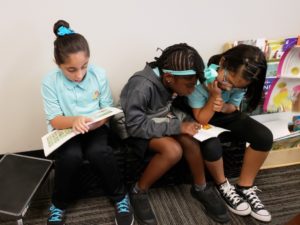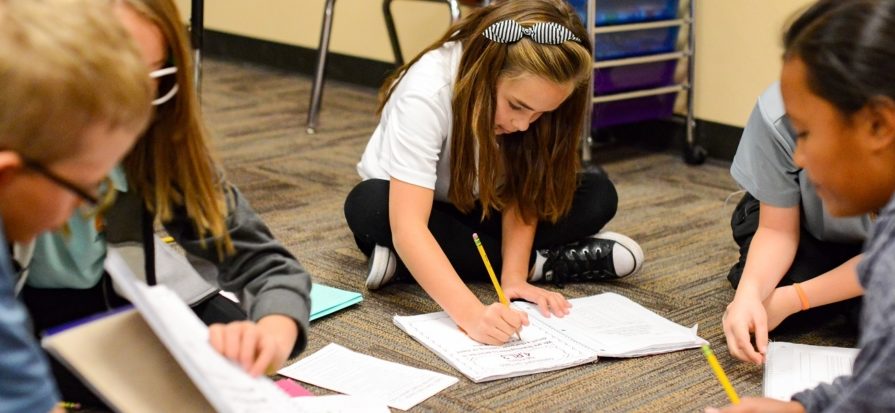In the Athlos academics curriculum, when it comes to reading, writing, and math, it’s more than what students learn, but how they learn, comprehend, and apply their newfound knowledge to real-world problems.
How Important are Reading, Writing, and Math?
For years, reading, writing, and math have been viewed as indicators on how well a young student is performing in school. A recent study shows most Americans still place reading, math, and writing as among the top skills required to succeed in life. At Athlos, these skills better serve as tools than as indicators of academic success, because simply performing a skill is different than knowing where, when, and how to use it in the real world.
 Supporting research behind the Athlos curriculum shows that students who sharpen these skills are more likely to become more adept in basic social communication skills as well. Whether children are speaking face-to-face, texting, vlogging, or creating a visual product that demonstrates their knowledge, being able to read, write, and perform everyday math only enhances the student’s ability to operate at school and at home.
Supporting research behind the Athlos curriculum shows that students who sharpen these skills are more likely to become more adept in basic social communication skills as well. Whether children are speaking face-to-face, texting, vlogging, or creating a visual product that demonstrates their knowledge, being able to read, write, and perform everyday math only enhances the student’s ability to operate at school and at home.
Reading, writing, and math are paramount skills to a student’s education, but useless if the student doesn’t know what to do with them or care to practice them.
Because students often view these skills as two-dimensional topics, Athlos takes them a step further by helping students learn how they work together, support other facets of their education, and can be used in real-world problems.
How Athlos Brings Real-World Experiences into The Classroom
Just as students who learn piano music theory immediately practice applying their new-found knowledge using simple scales and short songs, so do Athlos students who learn reading, writing, and math. Here’s how each topic is explored:
-

Like traditional teaching methods, reading is often taught alongside English in Athlos classrooms. Things like incentives, tracking reading levels, and constant communication and updates with parents are just a few of the tactics Athlos uses to help students move from learning to read, to reading to learn. Athlos school leaders also strive to incorporate new tactics, involving local reading groups and book clubs, and parent involvement at home. Ultimately, the goal is to help students love to read to learn.
- Each Athlos English grade level has vocabulary lists, a structured curriculum, assessments, and other requirements that vary by state standards. Our classrooms and curriculum are also designed to be flexible to the needs of the school culture. This flexibility is beneficial for educators who are interested in learning new teaching tactics, and for a wide-range of learners, including those learning English as a second language.
- In math, we practice the best methods taught at top U.S. universities and institutions. Through these methods, we teach students for the sake of understanding instead of just knowing the material. Students are not only taught to know how to perform the calculations, but why. Knowing “how” not only enables students to flexibly use procedures, but to understand the relationships of these procedures within the structure of mathematics. Knowing “why” enable students to use concepts flexibly, extend their knowledge to new situations, and connect them to life outside of school.
Prepared Minds, Prepared Students
Athlos recognizes that students today aren’t just preparing to solve real-world problems, but to solve problems that don’t exist yet, using tools and techniques that are not yet invented. As Athlos students work through reading, writing, and math, alongside their other subjects, they are expected to challenge the status quo and think outside the box.
When students connect these skills in the classroom to what they experience outside the school, they feel the same emotions they would when solving a puzzle. They grow a desire to apply their knowledge, ask questions, and make real world differences.

















